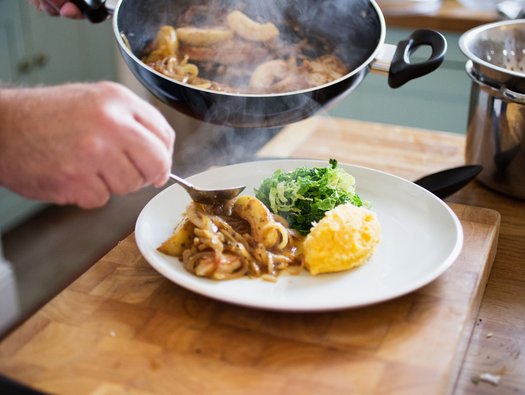Pork medallions with apples and mustard

This is a delicious and hearty high protein dish, low in salt, potassium and phosphate which makes it perfect as a post dialysis meal.

This is a delicious and hearty high protein dish, low in salt, potassium and phosphate which makes it perfect as a post dialysis meal.
4 pork medallions (approx. 140g each)
1 tablespoon olive oil
1 eating apple
1 onion, halved and sliced
100ml low salt chicken stock
2 teaspoons Dijon or wholegrain mustard
50g unsalted butter
Black pepper
2 teaspoons dried sage
300g savoy cabbage, finely sliced
1 swede (approx. 600g)
Peel and cut the swede into 2.5cm chunks. Put in a large saucepan and fill with enough water to cover. Cover with a lid and bring to a boil then reduce heat and simmer for 20 minutes, or until the swede is soft. Drain and discard the water, leave to stand with the lid on.
Meanwhile, rub the pork steaks with a little oil and season with pepper to taste. Heat a large frying pan and fry the pork for 2 minutes on each side until golden brown. Transfer to a plate to rest.
Peel and core the apple and cut into eight segments. Peel and slice the onion. Adding a little more oil to the pan, fry the apples, onions and sage for 5 minutes or until the apples have softened.
Make up the stock and pour over the mixture and spoon in the mustard, then return the pork to the pan and simmer for 10 minutes until the sauce has reduced by about a third and pork is cooked through.
While the pork is cooking, finely slice and add the savoy cabbage to a saucepan of water and boil for 10-15 minutes until cooked, then drain and discard the water.
Remove the lid on the swede, mash until smooth. Season with pepper and cook for a 1-2 minutes. Serve the pork with the mashed swede, boiled savoy cabbage and the mustard and apple mixture.
The swede and apple are the main sources of carbohydrate. The carbohydrate value of this dish has been provided for those who have been trained in insulin adjustment.
Following the serving sizes provided in this recipe, this dish is low in both potassium and phosphate. Swede is naturally lower in potassium so makes a good choice to accompany this meal. Boiling the swede and savoy cabbage, draining and discarding the waters helps to reduce the potassium content.
The pork will contain some phosphate if you have been prescribed a phosphate binder ensure you take them with this dish.
This is a high protein dish, provided by the pork, therefore a perfect meal for anyone receiving dialysis. If you have been advised to reduce your protein intake then use less pork, eg approx. 100g for a portion.
Use a gluten-free stock cube.
This fat content of this meal could be reduced further by using a low fat spread in place of butter and by using the oil more sparingly.
This is a low salt meal. Flavour was added with mustard, apples, sage and pepper.
The meat is the most expensive part of the recipe. Look for offers on the meat or choose frozen pork which is often cheaper. Thoroughly defrost in the fridge before cooking.
Once cooled store in an airtight container and keep in the fridge for up to 3 days. Reheat thoroughly before serving.
By giving us your email address, you're giving us permission to send you the latest news from Kidney Care UK. Further information about how we protect and use your personal data is available in our Privacy policy. If you would like to change the way we communicate with you at any time please email [email protected]. You can unsubscribe at any time by using the link at the bottom of every email we send.